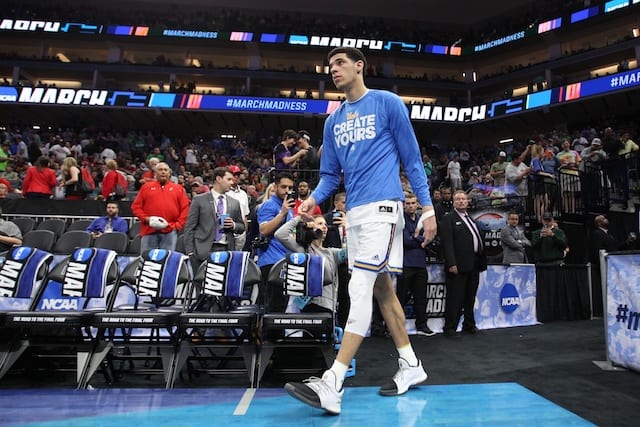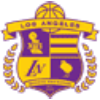The Los Angeles Lakers were fortunate enough to keep their top-three protected pick in the draft lottery, and just minutes later rumors spread that teams were already expressing interest in trading for D’Angelo Russell.
That’s telling. If Russell was every bit the aloof, underperforming malcontent that some make him out to be then the interest in him would be minimal. Sure, it hasn’t been all no-look passes and string music from the former number two pick, but in a sophomore season where Russell wasn’t even old enough to buy a drink until late February he posted averages of 15.6 points, 4.8 assists, 1.4 steals, and 2.1 threes per game in just 28.7 minutes.
Those numbers compare favorably to Memphis’ Mike Conley, who is currently the highest-paid player in the league and is well-respected for his play.
Of course, the trade chatter is understandable. From an outsiders perspective, there is only room for one starting point guard and not enough basketballs to satisfy both Russell and Lonzo Ball, the favorite to land with the Lakers in next month’s draft. Therefore, the Lakers might as well ship out Russell and hand the keys to the kingdom to Ball, the shiny new toy who has a little extra sparkle to him due his So Cal roots and vociferous father.
Let’s pump the breaks on that flawed thinking.
First of all, it’s not a certainty that the Lakers will even draft Ball. Both Josh Jackson and De’Aaron Fox will do all they can to make the decision as difficult as possible, and the Lakers will seriously look at all candidates.
Second, even if the Lakers do select Ball, there is plenty of reason to believe that he and Russell could actually co-exist in a modern backcourt, with both handling some of the playmaking responsibilities.

In fact, we may have already seen the blueprint for such a system. Down the home stretch, Russell started at shooting guard and Jordan Clarkson took on point guard responsibilities. At the time, it seemed a bit odd that the roles weren’t reversed, as Clarkson has spent all but his rookie year as a shooting guard and Russell has been tabbed as Los Angeles’ point guard of the future since 2015. In hindsight, however, the move may have been a bit of forward-thinking on the part of Luke Walton.
After all, going into a draft loaded with point guards, it’s probably a good idea to know whether your own young, valuable quarterback can successfully flex over to the two.
And Russell proved that he can.
The sample size is small, but he was able to show that he can operate off the ball without negatively affecting his production. In fact, it may even be preferable for Russell to get more looks on the wing, where he doesn’t need to worry as much about initiating the offense or getting certain players shots. Instead, he can just be aggressive and take what the defense gives him, whether that’s a shot for himself or an open look for someone else.
As we saw last season, an aggressive Russell is the best Russell.

It can also be argued that Ball and Russell are too similar to work together. They are both versatile guards who aren’t necessarily quick-twitch athletes, which causes them to rely on savvy more than anything else. Player comps are difficult, but both are more Steve Nash-style than Russell Westbrook in terms of physical strengths.
However, the big difference is that Russell, more often than not, defaults to finding his own shot. When the game is on the line, he wants the ice in his veins to guide the ball into the basket.
Conversely, Ball regularly turns down opportunities for himself in order to dish it to an open teammate, which allowed him to lead the NCAA in assists last season. Ball’s passing may also be exactly what allows Russell to come into his own.
Ball keeps things moving and prevents the offense from bogging down, which head coach Luke Walton’s system requires. If passing is contagious, Ball is patient zero, infecting the rest of the team and causing the ball to ping around offensively. He helped transform UCLA’s offense last season into one of the best in college basketball, and the hope is that he can replicate that impact in the NBA.
Meanwhile, attack-minded players like Russell, Julius Randle, and occasionally Brandon Ingram will be ready to catch passes zipped their way and make the right read. All four have the ability to receive the ball and then create for themselves or others, which is critical in today’s NBA. A rising tide raises all ships, and with Ball on the court we should expect to see Russell take advantage of more open looks.
That said, transitioning from college to the NBA is incredibly difficult, and just as Ball will ease Russell’s burden of running the offense, so too will Russell help alleviate Ball’s growing pains. Having a second ball handler on the floor takes a bit of the pressure off for him to completely run the show, which is a difficult task for anyone, let alone a rookie.
The ultimate vision is to feature a team full of versatile, interchangable parts, and putting Russell and Ball together offensively is a solid step in that direction.

Of course, it’s on the other end of the floor that things get dicey for a Russell/Ball backcourt pairing. Neither are known for their defensive chops and given their aforementioned lack of explosive athleticism, it’s going to be tough to keep opposing guards out of the paint.
On a Lakers team that is already one of the worst in the league at getting stops that could be a major problem. This is where defensive ace Fox wins over some fans since he could conceivably make up for some of Russell’s deficiencies on that end of the floor.
Still, the ceiling on a backcourt featuring Russell and Ball is just so high that it’s worth the risk. Worst-case, if it becomes clear that the two just aren’t clicking, then the Lakers can make a move at that time. Until then, they might as well find out what they have. After all, there is no sense in fixing something that isn’t broken yet.





